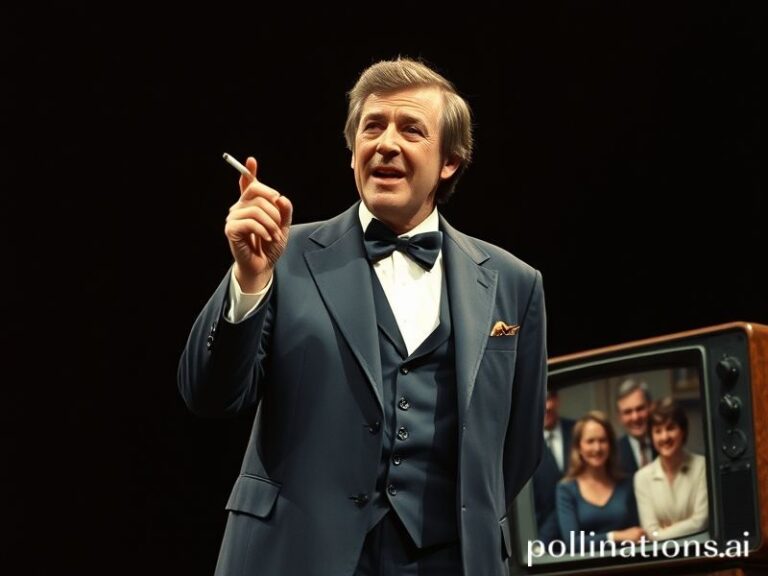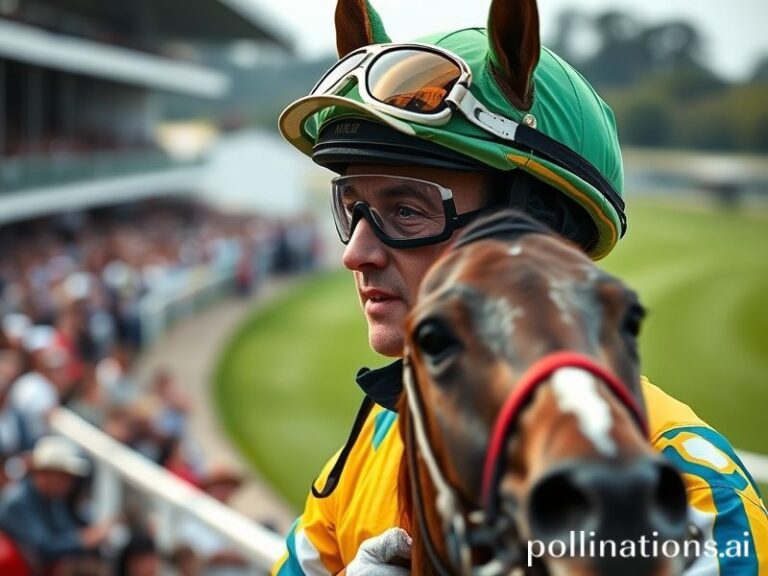How Hamilton Conquered the Globe and Monetized the Revolution
The World Sings Along to a Caribbean Bastard’s Revenge Fantasy
By L. Marín, Senior Correspondent, Dave’s Locker
From the barrios of Buenos Aires to the karaoke booths of Seoul, the planet has spent the better part of a decade chanting “I’m not throwing away my shot” while clutching overpriced cocktails and pretending the Founding Fathers were rapping polyglots. Lin-Manuel Miranda’s Hamilton—once a scrappy off-Broadway curiosity—has metastasized into the planet’s unofficial civics lesson, a Broadway export now more widely disseminated than democracy itself. And because nothing says “global soft power” like Alexander Hamilton in a hoodie, the show has become a Rorschach test on which each nation projects its own neuroses.
Europeans, who know a thing or two about revolutions that eat their young, treat Hamilton like a quaint American fever dream: “Cute,” they mutter over €18 lattes, “you had one revolution and it produced a Treasury Secretary instead of a guillotine.” Meanwhile, British audiences clap politely at the West End, secretly thrilled to watch a former colony turn its rebellion into jazz hands. In France, the show is marketed as “le hip-hop révolutionnaire,” which roughly translates to “the thing we would have done if we’d had Spotify in 1789.” The Germans, ever methodical, put it in the same cultural bucket as Oktoberfest: loud, historical, and best enjoyed after three beers.
Across the Pacific, China’s censors allowed a heavily redacted Disney+ stream—no mention of the French Revolution, no references to sedition, and definitely no King George III simpering like a spurned ex. The result plays like a TED Talk on fiscal responsibility delivered by a multi-ethnic boy band. Still, Shanghai stockbrokers have taken to quoting “The Room Where It Happens” during IPO pitches, which is either progress or proof that late-stage capitalism will sample anything.
In Latin America, Hamilton lands with the awkward grace of a tourist who learned all the slang from Netflix subtitles. Mexico City audiences cheer the immigrant storyline while pretending not to notice that Hamilton himself was, by today’s standards, the kind of visa-overstayer certain presidents want to wall off. Brazilians have repurposed “My Shot” into an anthem against their own endemic corruption; the irony of borrowing a musical about one country’s founding elites to protest another’s is apparently just part of the choreography.
Africa, often an afterthought in global pop-culture supply chains, has embraced the bootlegs. Lagos viewing parties project the Disney film onto bedsheets rigged between palm trees; the power cuts at precisely the moment Hamilton meets Burr, and generators wheeze back to life in time for the duel. Local artists have started remixing the score with Afrobeats, because nothing says “young, scrappy, and hungry” like a 200-bpm talking drum under Lafayette’s French-English spitfire.
The Middle East, ever punctual in catching up on Western fads five years late, is currently in the bargaining phase: Saudi Arabia’s sovereign wealth fund reportedly dangled obscene sums for a gender-segregated arena production that would replace the Schuyler sisters with the “Schuyler cousins” to avoid scandal. Somewhere in Tehran, a black-market DVD is making the rounds with Persian subtitles that translate “bastard, orphan, son of a whore” into something that loosely means “misunderstood go-getter.” Diplomats call this cultural exchange; cynics call it inevitable.
And then there’s the merch. From Manila hawkers flogging knockoff “Work!” mugs to Paris boutiques selling satin waistcoats priced like rent, Hamilton has achieved the final stage of global saturation: it’s now a lifestyle brand. One can purchase Hamilton-branded gin (“The Reynolds Pamphlet—distilled secrets in every sip”) or a King George scented candle that allegedly smells like “petty and tyranny.” Nothing says revolutionary fervor like a $42 candle that burns for exactly 1 hour, 46 minutes—the runtime of Act I.
The broader significance? Hamilton has done what centuries of diplomacy could not: convinced disparate nations to agree on a single historical remix where everyone gets a verse, even the enslaved people conveniently left out of the libretto. It’s a triumph of narrative capitalism—sell the revolution back to the masses, but make it rhyme, diversify the cast, and for God’s sake, monetize the mixtape. In a world tilting toward autocracy, climate catastrophe, and TikTok, perhaps the most honest takeaway is that we’re all willing to pay premium prices to watch a dead immigrant rap about credit scores. The revolution will not be televised; it will be streamed, subtitled, and sold with an optional souvenir shot glass that reads “Rise Up (and tip your bartender).”
Humanity, ever resourceful, has found a way to turn existential dread into a sing-along. If that isn’t the American dream, what is?







